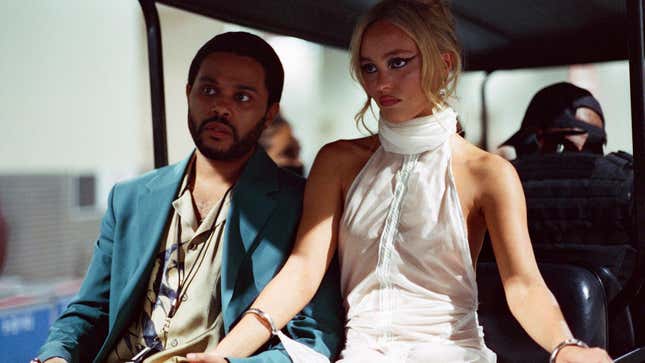Not Even a Good Twist Could Save ‘The Idol’ From Itself
The five-episode series had an opportunity to atone for some of its "World Class" sins. To no one's surprise, it didn't take it.
EntertainmentTV

For little more than a millisecond, it appeared as though the season finale of HBO’s The Idol might’ve regained the “feminist lens” it reportedly shirked thanks to the show’s co-creator, The Weeknd (née Abel Tesfaye). The lazy, overall lackluster series largely opted for sex and shock value, though neither were particularly effective or even memorable. But in its finale episode, “Jocelyn Forever,” protagonist Jocelyn (Lily-Rose Depp) was primed to have the final say in cult-leader Tedros’ (Tesfaye) attempted siege of her career and personal life.
“There will be a turning [of] the table, and I think a really exciting set-up entering into Season 2…It will be very interesting to see how people respond to this last episode and see how things turn,” Da’Vine Joy Randolph, who portrays Jocelyn’s manager, Destiny, promised Variety in anticipation of the finale. “It’s going to show you something different that we haven’t seen in a while.” Did it? Not really, but it definitely could’ve.
In the end, Jocelyn, the vulnerable pop star fresh off a stay in a psychiatric facility, is revealed to be a master manipulator capable of ruthlessly robbing longtime friends of their livelihoods, exaggerating childhood abuse, and very publicly dating a violent man who went to prison for human trafficking. In essence, the emotionally fraught young woman we’ve seen and been told by multiple characters has been exploited for much of her life is supposedly just…a two-dimensional girlboss. Whether the audience should respect or revile her is utterly unclear. Either way, I don’t really care, which is to be expected when men of meager talent try to write a complex female character.
Early in the episode, tensions between Jocelyn and Tedros have escalated, and she effectively shuts him out of the creative process of her album and tour. This, after four insufferable episodes that see Tedros inflicting physical and psychological abuse upon Jocelyn and anyone that gets close to her, feels like something of a victory. Then, she holds a stiff—bordering on embarrassing—showcase for the harem of talented people Tedros moved (rent-free) into her basement for her management team. They’re impressed—so much so that despite the fact that these individuals are entirely unknown and without a body of professional work, they’ll be awarded the opening slot on Jocelyn’s tour. Tedros won’t receive credit for their discovery, and Jocelyn demands that he leave her home once and for all. This, too, seems like an encouraging shift for her who, by and large, has spent the season just kind of getting fucked (literally and figuratively). The aforementioned seemed like the groundwork for both a personal and professional reinvention in spite of Tedros, as opposed to one sanctioned by him. This was, unsurprisingly, not the case.
-

-

-

-

-

-

-

-

-

-

-

-

-

-

-

-

-

-

-

-

-

-

-

-

-

-

-

-

-

-

-

-

-

-

-

-

-

-

-

-








































